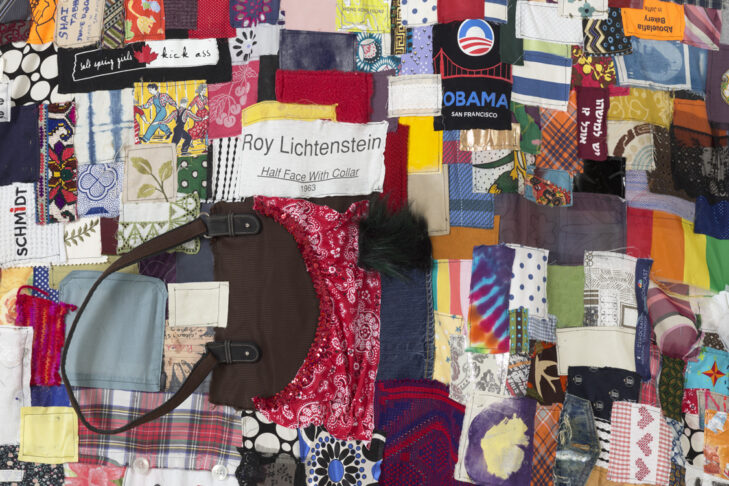When celebrated mixed-media artist Caron Tabb sat down for an intimate one-on-one conversation with JALSA executive director Cindy Rowe, it was all about “artivism” and Tabb’s call to action expressed through her new exhibit, “Humanity Is Not a Spectator Sport,” now on view at the Beacon Gallery on Harrison Avenue in Boston.
Following in the footsteps of JALSA’s crowd-raising events, which in the past have included Menorahs with Michelle (Wu), Latkes with Dukakis, Babka with Barney (Frank), Dreidels with Deb (Goldberg) and several others, this year it was “Creativity with Caron,” taking place on Dec. 7 in celebration of the prior week’s #GivingTuesday campaign.
Tabb’s exploration of artivism—how art can inspire us to take action to confront racial and social inequalities—is deeply rooted in her Jewish identity. Sharing her view on the role we all play in social movements, Tabb said, “In order for humanity to succeed, we have to be active participants.” This philosophy is at the heart of her approach when she begins the task of processing the concepts and ideas behind her thought-provoking pieces.
At the core of Tabb’s Beacon Gallery exhibit is tzedakah, the Hebrew for “charity,” derived from the root word tzedek, meaning justice or righteousness. In Judaism, tzedakah is a religious imperative, even for those who have little to give. Tabb’s exhibit includes two tzedakah boxes inspired by the work of Ruth Messinger, former president of American Jewish World Service, and chaplain Clementina Chéry, co-founder and CEO of the Louis D. Brown Peace Institute (named in memory of her 15-year-old son killed by an act of gun violence). They are striking visualizations of the power of using one’s voice to bend the arc of justice.
In one of the most heart-wrenching pieces in the exhibit, Tabb takes us back to her very beginnings, displaying her own heavily redacted birth certificate mounted and framed behind broken glass. “To be born white,” according to Tabb, “is to be born fractured into a singular category,” particularly as she was in South Africa under apartheid. This origin story is woven throughout her show, with race serving as backdrop for many of the statements made by her pieces.
The virtual gallery talk, attended on Zoom by many of JALSA’s supporters, provided a window into how art can amplify themes of social justice, and most particularly how the pandemic and our country’s recent racial awakening should be the shofar call for us all to get involved.
“Humanity Is Not a Spectator Sport” will be at the Beacon Gallery until Jan. 17.
This post has been contributed by a third party. The opinions, facts and any media content are presented solely by the author, and JewishBoston assumes no responsibility for them. Want to add your voice to the conversation? Publish your own post here. MORE


